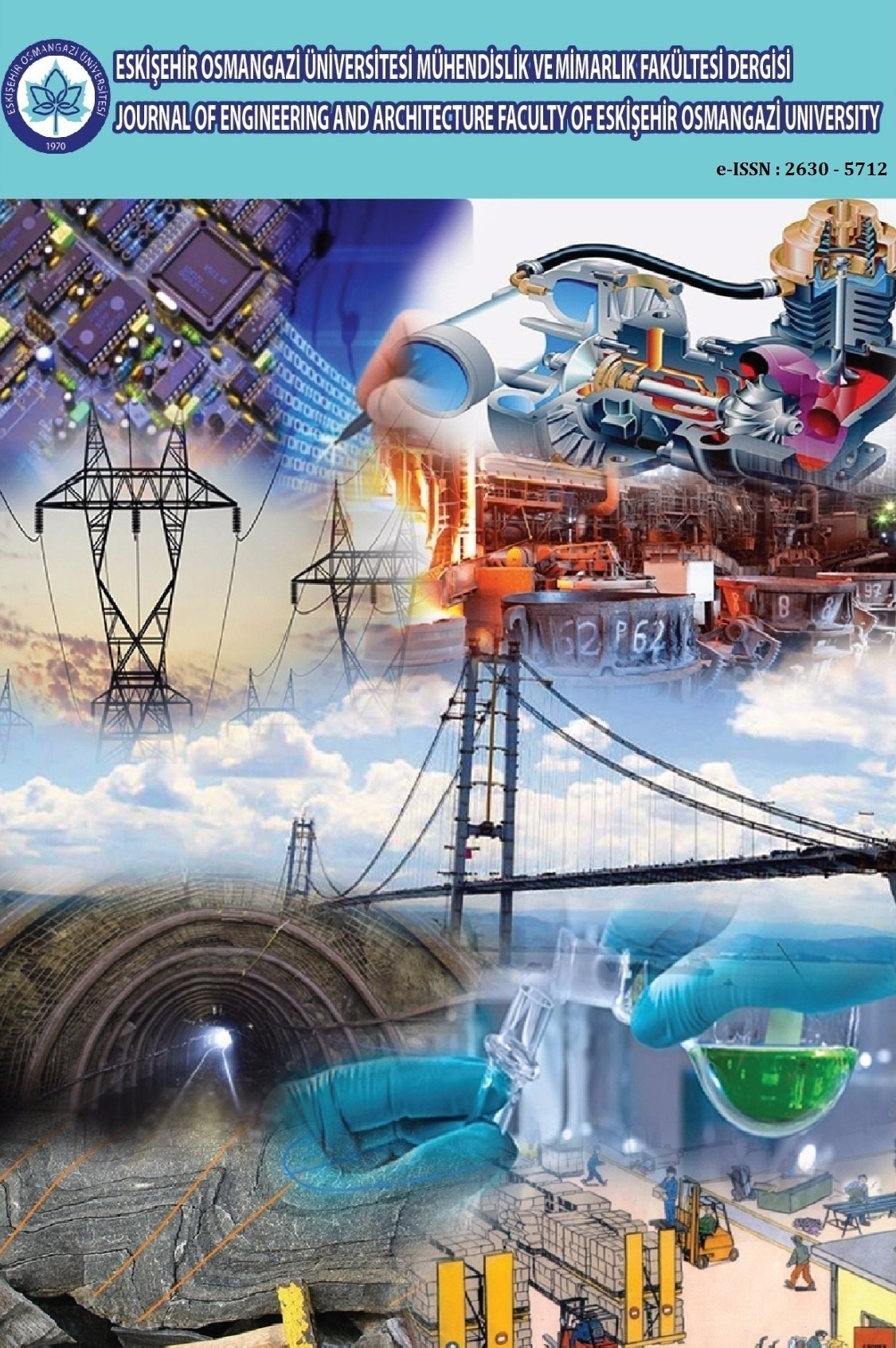ENERJİ-ETKİN ESNEK ATÖLYE TİPİ MAKİNE ÇİZELGELEME PROBLEMİ İÇİN ÇOK AMAÇLI BİR MATEMATİKSEL MODEL
Enerji Etkin Çizelgeleme, Esnek Atölye Tipi Makine Çizelgeleme, Yeniden Dolaşım, Makine Uygunluk Kısıtları, Toplam Ağırlıklı Tamamlanma Zamanı
A BI-OBJECTIVE MATHEMATICAL MODEL FOR ENERGY-EFFICIENT FLEXIBLE JOB SHOP MACHINE SCHEDULING PROBLEM
Energy Efficient Scheduling, Flexible Job Shop Scheduling, Recirculation, Machine Eligibility Restrictions, Total weighted completion time,
___
- Aqel, G. A., Li X. ve Gao L. (2019). A modified iterated greedy algotihm for flexible job shop scheduling problem. Chinese Journal of Mechanical Engineering, 32 (21). doi: https://doi.org/10.1186/s10033-019-0337-7
- Deliktaş, D., Torkul O. ve Üstün Ö. (2019). A flexible job shop cell scheduling with sequence-dependent family setup times and intercellular transportation times using conic scalarization method. International Transactions in Operational Research, 26 (6), 2410-2431. Erişim adresi: https://onlinelibrary.wiley.com/doi/epdf/10.1111/itor.12407
- Demircioğlu, M. (2019). Yapay sinir ağları kullanarak enerji tasarruflu atölye tipi çizelgeleme. Çukurova Üniversitesi Sosyal Bilimler Enstitüsü Dergisi, 28 (3), 143-154. doi: https://doi.org/10.35379/cusosbil.644997
- French, S. (1982). Sequencing and Scheduling: An Introduction to the Mathematics of the Job-Shop. New York: Ellis Horwood Series.
- Karabulut, M. A. ve Saraç, T. (2019). Kapasite kısıtlı esnek atölye tipi çizelgeleme problemi için üç aşamalı bir çözüm yaklaşımı ve bir işletmede uygulanması. Eskişehir Osmangazi Üniversitesi Mühendislik ve Mimarlık Fakültesi Dergisi, 27 (3), 233-241. doi: http://dx.doi.org/10.31796/ogummf.613268
- Meng, L., Zhang, C., Shao, X. ve Ren, Y. (2019). MILP models for energy-aware flexible job shop scheduling problem. Journal of Cleaner Production, 210, 710-723. doi: https://doi.org/10.1016/j.jclepro.2018.11.021
- Mousakhani, M. (2013). Sequence-dependent setup time flexible job shop scheduling problem to minimise total tardiness. International Journal of Production Research, 51 (12), 3476-3487. doi: https://doi.org/10.1080/00207543.2012.746480
- Salido, M. A., Escamilla, J., Giret A. ve Barber, F. (2016). A genetic algorithm for energy-efficiency in job-shop scheduling. International Journal of Advanced Manufacturing Technology, 85, 1303-1314. Erişim adresi: https://link.springer.com/content/pdf/10.1007/s00170-015-7987-0.pdf
- Saraç, T., Sipahioğlu, A. ve Akyol Özer, E. (2020). A two-stage solution approach for plastic injection machines scheduling problem. Journal of Industrial and Management, 13 (5). doi: http://dx.doi.org/10.3934/jimo.2020022
- Wang, H., Jiang, Z., Wang, Y., Zhang, H. ve Wang, Y. (2018). A two-stage optimization method for energy-saving flexible job-shop scheduling based on energy dynamic characterization. Journal of Cleaner Production, 188, 575-588. doi: https://doi.org/10.1016/j.jclepro.2018.03.254
- Wang, S., Wang, X., Chu, F. ve Yu, J. (2019). An energy-efficient two-stage hybrid flow shop scheduling problem in a glass production. International Journal of Production Research, 58 (8), 2283–2314. doi: https://doi.org/10.1080/00207543.2019.1624857
- Wu, X. ve Sun, Y. (2018). A green scheduling algorithm for flexible job shop with energy-saving measures. Journal of Cleaner Production, 172, 3249-3264. doi: https://doi.org/10.1016/j.jclepro.2017.10.342
- Xing, L. N., Chen, Y. W., Wang, P., Zhao, O. S. ve Xiong, J. (2010). A knowledge-based ant colony optimization for flexible job shop scheduling problems. Applied Soft Computing, 10 (3), 888–896. doi: https://doi.org/10.1016/j.asoc.2009.10.006
- Zhang, G., Gao, L. ve Shi, Y. (2011). An effective genetic algorithm for the flexible job-shop scheduling problem. Expert Systems with Applications, 38 (4), 3563-3573. doi: https://doi.org/10.1016/j.eswa.2010.08.145
- Yayın Aralığı: Yılda 3 Sayı
- Başlangıç: 1986
- Yayıncı: Eskişehir Osmangazi Üniversitesi
GÖRÜNTÜ DOSYALARININ ŞİFRELENEREK GÜVENLİ ŞEKİLDE SAKLANMASI
Gülçin ÖZEVCİ, Oguz AKPOLAT, Hakan AYHAN, Fatma AYHAN
ATIK ANDEZİT VE MERMER TOZUNUN ÇİMENTO HARÇLARININ DAYANIM ÖZELLİKLERİNE ETKİSİ
Serhat ÇELİKTEN, Mehmet CANBAZ
Merve DURGUT, Şefika KAYA, Yeliz AŞÇI
ENERJİ-ETKİN ESNEK ATÖLYE TİPİ MAKİNE ÇİZELGELEME PROBLEMİ İÇİN ÇOK AMAÇLI BİR MATEMATİKSEL MODEL
Emine AKYOL ÖZER, Sevcan DİNCER, Hüseyin TAMER
OTOMOTİV SEKTÖRÜNDE KAİZEN YÖNTEMİ İLE TESİS YERLEŞİM TASARIMI VE REBA ANALİZİ
Meryem ULUSKAN, Mehtap Tutku ÖZYALINER
BİR İPLİK FABRİKASINDA SİPARİŞLERİN ÇİZELGELENMESİ
Çiğdem ŞENBAY, Tuğba SARAÇ, Ezgi AKTAR DEMİRTAŞ
BÜYÜK ÖLÇEKLİ BİR ÜRETİM İŞLETMESİNİN OFİSLERİNDE RİSK DEĞERLENDİRMESİ
Emin KAHYA, Gizem ADA, Özge ÇETİNKAYA
DEMANS ÖZELLİKLERİNİN BELİRLENMESİ İÇİN FİLTRE ÖZNİTELİK SEÇİM ANALİZİ
